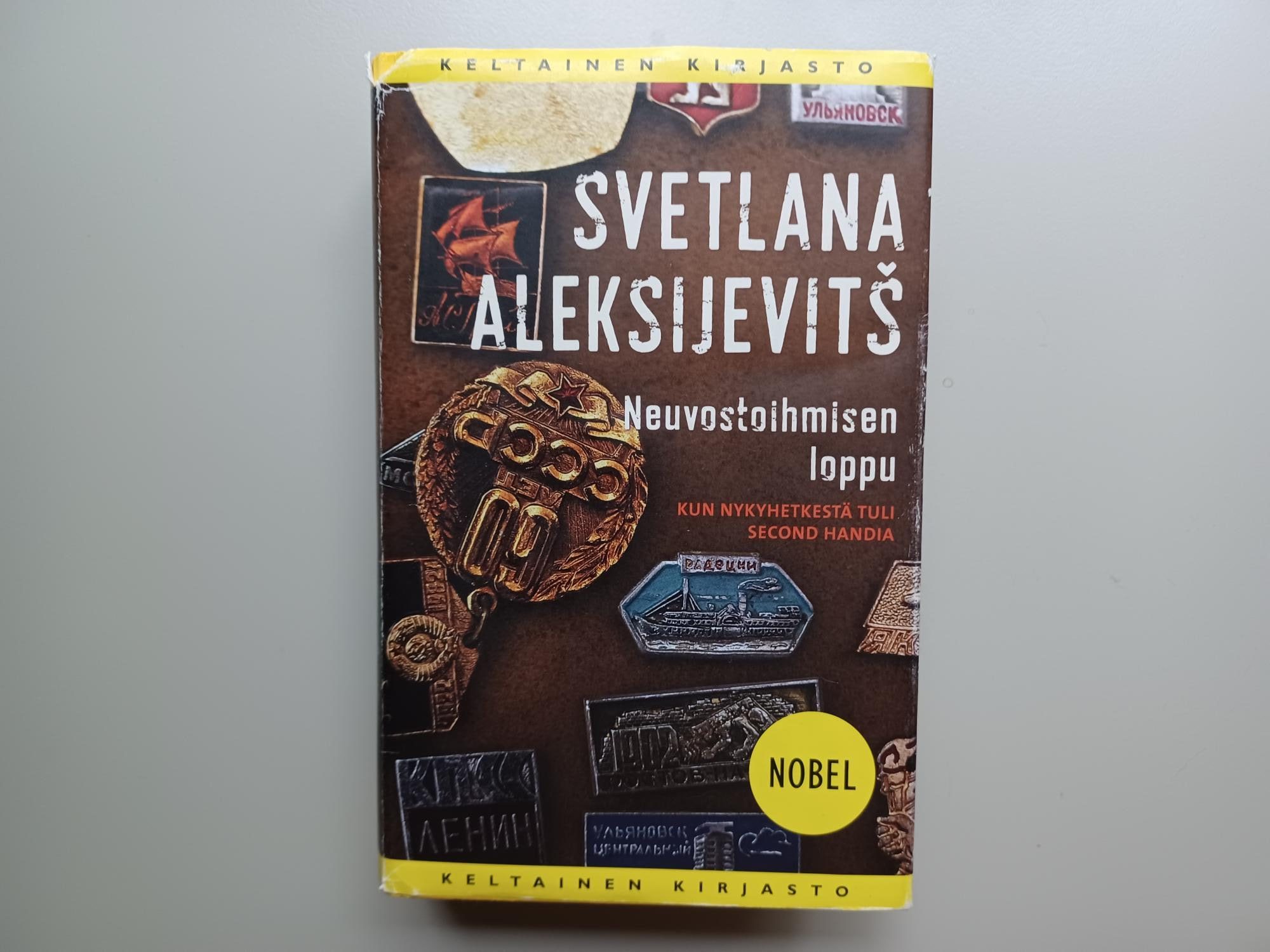Reflections on the Secondhand Time: The Last of the Soviets
Death is often painfully difficult to come to terms with, explain to others in words despite it being a part of what people have discussed of for thousands of years. When it comes to capturing the essentialities of this difficult topic, authors of biographies and artists are probably more widely known in handling these sensitive issues than scholars.
As thematic popular literature related to our research project Transnational Death, I recently read Secondhand Time: The Last of the Soviets (Vremya sekond hend, 2013). For this Nobel-winning book Svetlana Alexievich, a Belarusian journalist, and an author who from 1999 to 2012 conducted several interviews with people sharing their painful experiences of the Soviet rule, its demise, and transition to a new Russia – the end of the Soviet Union and several lives in the process.

Soon after reading a couple of these stories, I concluded that I do not have the skills to write about this book, because it felt too emotionally heavy and philosophically deep. While I initially gave up on the idea, after finishing the book I could not help but return to my original idea to write a blog reflecting on some of the perspectives that The Secondhand Time gave me in 2023. These include interpreting oral histories, and the emotionally loaded ideal of readiness to sacrifice and accept arbitrary death for the autocratic state in Russia in its “post-Soviet” context.
While I was baffled by the emotionally strong reading experience, it made me think about how to put these stories in perspective. How much can they tell (and mislead) perceptions of life and death in Russia? What kind of reservations should the reader then have about these memories and oral histories?
Alexievich shares her self-reflexive discussion in the book’s opening chapter, telling that she mostly sought for people who had digested the Soviet idealism so strongly that they could not get over losing the USSR. Moreover, Alexievich (in 2013) associates herself with her interviewees as “us”, the Homo Sovieticus who is easily recognizable in any country. Alexievich also cites one of the interviewees saying that only a Soviet person can understand another Soviet, suggesting the essentiality of post-Sovietness.
While since 2013 academic discussions have presented increasing critique against the “post-Soviet” as a colonialising concept, I believe that at times shared generational, including “(post-)Soviet” experiences can make a significant common ground between people. This is not nonsense. Unfortunately, other times differing heavy experiences and memories also breed conflicts. Moreover, some of this book’s readers may get wrong ideas about to what degree Homo Sovieticus is out there in real world if they forget that Alexievich intentionally and explicitly selected her interviewees based on what she considered as (post-)Soviet.
One of the people I discussed this book with, an expert of oral history said that they learned little new from Secondhand Time. For me, a researcher of contemporary media discussions, interviewed oral histories are not my strongest expertise, but I believe there is always something new that can be gradually learnt from life stories. This requires slow reading, giving each story enough time to open and having a pause between the stories to “digest” them. Reading several resembling stories in a row may also numb down the reader and hence miss the emotional (learning) experience of reading.
I am not sure what “facts” the Secondhand Time can teach, but as much as possible through a popular book format, Alexievich manages to present several life stories in a very captivating manner, providing emotional knowledge about people’s experiences of grave misfortunes in the given post-Soviet frame, and how they talk about it. Yet, the reader will not learn many details on how exactly Alexievich encountered her interviewees, many of whom she acknowledges had experienced strong mental traumas.
Sacrifice and loss
Most of the stories of Secondhand Time take place in Russia, but there were also people who moved across the (post-)Soviet borders from Armenia, Azerbaijan, Tajikistan, and others, some as labor force, others seeking for a haven in their former capital. They tell how people dealt with the excessive death from gulags to Afghanistan, the ethnic conflicts of the falling Soviet empire, and the (self-)destructive life of the 1990s.
Tacit uniting topics of the book’s stories include sacrificing one’s life to the state, ideology, and family. In the Soviet Union, many were brought up to the readiness to sacrifice themselves for the state and its ideals. This is connected to many people heard in the book wondering about the reasons why the Soviet Union fell: Why there were no guns, bullets, and no shed of blood or sacrifice of life to preserve it. Yet, there were blood and conflict, as other people’s experiences testify.
On the other hand, several of the book’s storytellers implied that they wanted to get rid of the repressive and arbitrary Soviet rule: get rid of the system of repression. Yet fewer of them said that they wanted capitalistic market economy in the years of hope preceding the fall:
”They (protesters against the August 1991 coup) wanted to die for freedom, not for capitalism. I think I was fooled. I do not need capitalism that we have been led to… Pushed to… Not in any form, not in American nor in Swedish” -design engineer on the Red Square in 1997.*
In the Secondhand Time, repeating cries of frustration included the often-repeated claim that without having a word to say about it, people lost their country where they knew how to live, that they could be proud of and believe in. These people felt quite the opposite of the country they got in return – The appreciation of high culture, philosophical literature, and productive labor were replaced with speculation, egoistic greed, and cynical ridicule towards idealists. Extreme wealth and poverty. The interviewees’ views about decreased appreciation and discussions about literature probably resonated with Alexievich herself, who as an author was inspired by (Belarusian) Soviet critical literature.
Acceptance and cynicism
The book’s stories featuring soldiers sent to war in Afghanistan and Chechnya include soldiers themselves, their (grand-)mothers, and significant others talking about the patriotic duty, some questioning it, some taking it as granted. Women’s roles come across quite traditional: mostly subjugating pity towards those who suffered from the state’s disregard of human life. The father’s part in these stories is typically strictly disciplinarian, alcoholised, distant, or in most cases absent, dead or deserted their family. In the context of contemporary Russia too, we usually hear much more about the soldiers’ mothers than about their fathers.
While times and circumstances were different, I could not help but reflect the myths of patriotic sacrifice going into nonsense missions in Afghanistan and Chechnya with Russia’s ongoing war in Ukraine. For this purpose, Alexievich’s earlier book “Boys in Zinc” (1991) would undoubtedly give even more perspective.
The people in this book who went into wars were often from poor (or military) background and this profile resonates with contemporary Russia, as currently people from relatively poor (and “ethnic”) regions of Russia are more likely going to Ukraine. This got me interested to find out how often conscripted, contract, or drafted soldiers in modern day Russia grew up in one parent household, but I could not find any reliable statistics at least with basic web enquiries. Yet, it is somewhat of general knowledge that the poor in Russia can less often avoid (pay off) military service, and one parent households tend to be economically less well-off.
The Secondhand Time does not only provide perspectives of people who oppose authoritarianism in Russia, but also of many who practically support it and reason about it in-length. For example, few interviewees claimed that the Stalinist repressions were “not so simple” that they should be unanimously condemned, but to a degree accepted as something that common people cannot comprehend or do anything about. This has echoes to the apologism of Russia’s open invasion of Ukraine in 2022: Many explain (perhaps partially to themselves) that the invasion is not so simply a condemnable act as killing lots of people fundamentally is.
This apologism of state’s wrongdoings from people telling their life stories in the pages of Secondhand Time was for me often more engaging, and thus heavier experience than studying similar topics from peoples’ online discussions (including video) in my own research. It appears to me that this apologism quite often comes from people who experienced many wrongs from forces bigger than themselves and who in their bitter anger believe that others deserve misfortunes at least as much as they do.
The interviews of the Secondhand Time are collected from the years 1999–2012, which from the contemporary perspective seems like a relatively decent period in Russian history. Yet, already from this period most of the interviewees gave a terribly comfortless image of the prospects of the value of individual life in Russia. On the other hand, I have encountered people from Finland and other countries as well, who are so utterly angry, disappointed, and bitter about their state and society that they could talk with similar hopelessness.
Concluding why some people accept and even defend arbitrary violence and death from the Russian state would easily be an oversimplification of complex and changing issues. While implicitly and vaguely suggesting that this stems from the experienced history of the Soviet Union and its collapse, Alexievich does not give explicit conclusions about this in Secondhand Time. However, she provides brilliant perspectives on what kind of related experiences various individuals went through and how these experiences influenced people in several different ways than cynicism alone.
*Translation is my own from the Finnish version, p. 198. Besides the main interviews documented in this book, Alexievich added some random multiglossal street chats recorded earlier in the 1990s, such as this quote.
To read other blogs from the Transnational Death project, click here or here.
